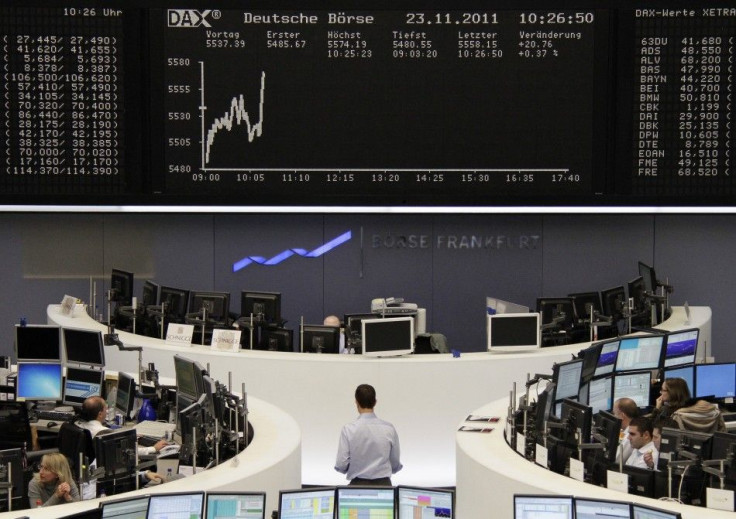Europe's Markets Lower Wednesday at Mid-Day

(Reuters) - European shares slipped from five-month highs on Wednesday, with Italy's UniCredit leading banks lower after it priced a capital increase at a deep discount, suggesting a weak appetite at a time when several lenders face capital increases.
UniCredit fell 8.5 percent after pricing its capital increase at a 43 percent discount to the theoretical ex-rights price.
The STOXX Europe 600 Banking euro zone Index fell 2.9 percent.
On Wednesday at mid-day, London's FTSE 100 was down 15 points to 5,685, Germany's DAX was down 42 points to 6,124, and France's CAC 40 was dow 33 points to 3,213.
For those that need to raise capital, they'll have to offer a significant discount to get it away. The wider banking sector is taking it quite badly today, said Ian King, head of international equities at Legal & General, which has 356 billion pounds ($556 billion) under management.
We retain our underweight position in banks - we're more risk averse and we're looking at healthcare.
At 1201 GMT, the FTSEurofirst 300 index of top European shares was down 0.4 percent at 1023.48 points after hitting a five-month high on Tuesday, when strong manufacturing data from the United States andChina helped to divert market attention from worries about the euro zone debt crisis.
However, resources stocks extended gains from Tuesday, and helped limit the index's decline. The STOXX Europe 600 Oil & Gas Index rose 0.5 percent, after gaining on Tuesday, when cyclical stocks benefited most from the upbeat manufacturing data.
But King warned that there would have to be further earnings downgrades in the wider market. The numbers look too high if Europe goes into recession - that is clearly not discounted in people's earnings expectations.
Earnings and accompanying statements will also be a major focus for investors in the coming days, with aluminium company Alcoa set to kick off the fourth-quarter U.S. reporting season on Monday.
However, King said a lack of visibility is one of the key themes. The euro zone crisis meant some companies might not be able to look forward with much confidence.
GERMAN AUCTION
Decent demand at a German bond auction failed to inspire equity investors.
Germany sold 4.06 billion euros of government bonds on Wednesday, drawing greater demand from investors than at the bond's launch in November.
Today's auction was not as bad as in late November but it clearly shows that dealers are very cautious in extending their long position in the super-rich German 10y segment, said broker Newedge.
Italy is among countries holding bond auctions this month. Rising bond yields were a major factor in pulling down equity markets in November, as investors worried that they might spark defaults, but they have since fallen from their peaks.
Across Europe, Britain's FTSE 100 was flat; Germany's DAX and France's CAC40 fell 0.6 and 0.7 percent respectively. Italy's FTSE MIB and Spain's IBEX fell 1.4 and 1.8 percent respectively.
The blue chip Euro Stoxx 50 index, fell 1.2 percent to 2,360.24 after stalling just below a strong resistance level at 2,402 points on Tuesday, which corresponds to a peak hit in early December.
We're seeing some overbought signs on the hourly chart, but as long as prices manage to stay above 2,300, we should see some upside potential in the coming weeks, said Roelof-Jan Van den Akker, senior technical analyst at ING, adding upside should be limited at 2,500.
--
© Copyright Thomson Reuters 2024. All rights reserved.











